Comprehensive Guide to Garden Maintenance in Pinner
Understanding Garden Maintenance
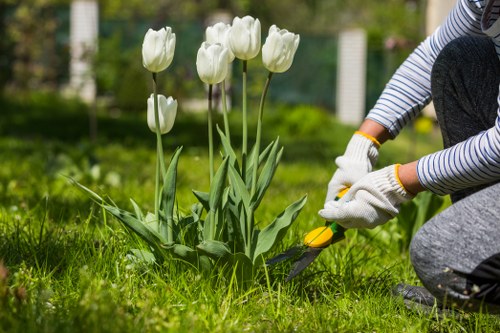
Maintaining a thriving garden in Pinner requires dedication, knowledge, and the right strategies. Whether you're a seasoned gardener or just starting, understanding the fundamentals of garden maintenance is crucial for ensuring your outdoor space remains vibrant and healthy throughout the year.
Proper garden maintenance involves a combination of regular tasks such as pruning, weeding, watering, and fertilizing. Additionally, understanding the local climate and soil conditions in Pinner can help tailor your gardening practices to suit the specific needs of your plants.
One of the first steps in effective garden maintenance is assessing the current state of your garden. This includes identifying any existing problems, such as pest infestations, diseases, or areas of poor soil quality. By conducting a thorough assessment, you can develop a targeted maintenance plan that addresses these issues and promotes overall plant health.
Seasonal Garden Care
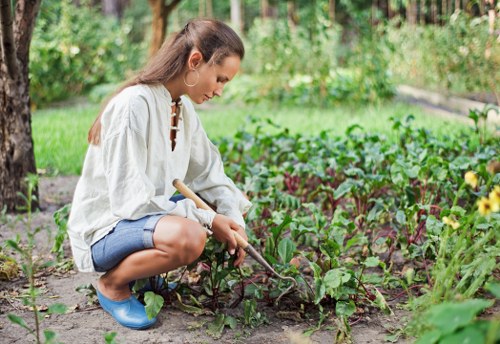
Garden maintenance varies significantly with the changing seasons. Each season in Pinner brings its own set of challenges and opportunities for gardeners. Adapting your maintenance routines to the seasonal shifts ensures that your garden remains resilient and continues to flourish.
Spring: The onset of spring is an ideal time for planting new flowers and vegetables. It's also important to perform a thorough cleanup of your garden beds, removing any dead plants or debris from the winter months.
Summer: During the summer, focus on regular watering and mulching to retain soil moisture. Pruning overgrown plants and managing pests are essential tasks to keep your garden healthy during the hot months.
Essential Tools for Garden Maintenance
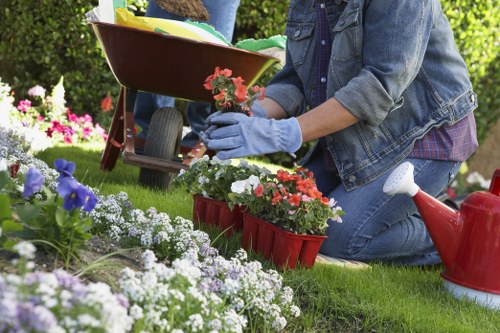
Having the right tools is essential for efficient garden maintenance. Investing in quality gardening equipment can make tasks easier and more enjoyable.
- Pruners and Shears: Essential for trimming and shaping plants.
- Watering Systems: Drip irrigation or soaker hoses can help maintain consistent soil moisture.
- Soil Testers: Useful for assessing soil pH and nutrient levels.
Additionally, protective gear such as gloves, hats, and knee pads can enhance your gardening experience by providing comfort and safety.
Regular maintenance and proper storage of your tools will extend their lifespan and ensure they are always ready for use when needed.
Soil Health and Fertilization
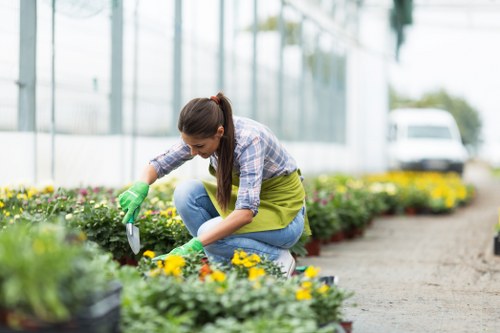
Healthy soil is the foundation of a thriving garden. In Pinner, understanding the specific soil composition and adjusting your fertilization practices accordingly can lead to better plant growth and yield.
Conducting a soil test helps determine the nutrient content and pH level of your garden soil. Based on the results, you can select appropriate fertilizers to address any deficiencies and create an optimal growing environment for your plants.
Incorporating organic matter, such as compost, into your soil improves its structure, enhances water retention, and promotes beneficial microbial activity. Regularly amending your soil with organic material is a sustainable practice that supports long-term garden health.
Pest and Disease Management
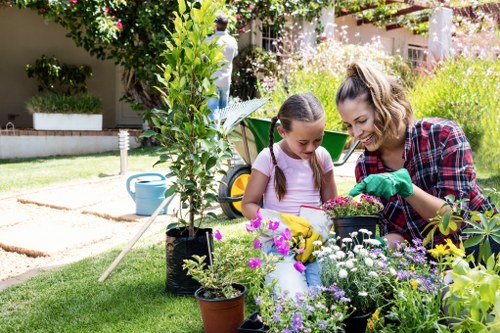
Effective pest and disease management is critical for maintaining a healthy garden in Pinner. Identifying and addressing issues promptly can prevent minor problems from escalating into major setbacks.
Integrated Pest Management (IPM) is a holistic approach that combines biological, cultural, and chemical methods to control pests and diseases. By monitoring your plants regularly and using eco-friendly solutions, you can manage infestations while minimizing environmental impact.
Encouraging beneficial insects, such as ladybugs and predatory beetles, helps naturally regulate pest populations. Additionally, practicing crop rotation and selecting disease-resistant plant varieties can reduce the likelihood of pest and disease outbreaks.
Pruning and Trimming Techniques

Pruning and trimming are essential aspects of garden maintenance that promote plant health and aesthetics. Proper techniques ensure that plants develop strong structures and maintain their desired shapes.
When pruning, it's important to remove dead or diseased branches to prevent the spread of infections. Additionally, selective pruning can enhance sunlight penetration and air circulation within the plant canopy, reducing the risk of fungal diseases.
For flowering plants, regular pruning encourages the growth of new blooms and extends the flowering period. Understanding the specific pruning requirements of different plant species ensures that you support their natural growth patterns.
Watering Strategies

Efficient watering is crucial for maintaining plant health, especially during the hot summer months in Pinner. Developing a consistent watering schedule tailored to the needs of your garden can prevent both overwatering and drought stress.
Installing a drip irrigation system provides targeted watering to plant roots, minimizing water wastage and reducing the risk of fungal diseases caused by wet foliage. Mulching around plants also helps retain soil moisture and regulates soil temperature.
It's best to water your garden during the early morning or late evening to reduce evaporation and ensure that plants absorb maximum moisture. Monitoring soil moisture levels with a moisture meter can help you adjust your watering practices based on real-time needs.
Lawn Care and Maintenance

A well-maintained lawn enhances the overall appearance of your garden. Regular lawn care involves tasks such as mowing, aerating, and fertilizing to keep the grass healthy and lush.
Mowing: Keeping your lawn at an optimal height encourages deep root growth and reduces weed proliferation. Ensure that your mower blades are sharp to make clean cuts that minimize stress on the grass.
Aeration: Aerating your lawn annually helps alleviate soil compaction, allowing air, water, and nutrients to penetrate deeper into the soil.
Plant Selection and Placement

Choosing the right plants for your garden is a critical aspect of successful garden maintenance in Pinner. Selecting species that are well-suited to the local climate, soil conditions, and available sunlight ensures better growth and reduces maintenance efforts.
Consider native plants as they are adapted to the regional environment and typically require less water and care. Additionally, incorporating a variety of plant types, including perennials, annuals, shrubs, and trees, adds diversity and visual appeal to your garden.
Strategic placement of plants based on their light and water requirements contributes to a balanced and sustainable garden ecosystem.
Weeding and Mulching

Weeding is an ongoing task in garden maintenance that helps prevent competition for nutrients, water, and light. Regularly removing weeds ensures that your primary plants can thrive without being overshadowed by invasive species.
Mulching is an effective strategy to suppress weed growth, conserve soil moisture, and regulate soil temperature. Organic mulches, such as bark, straw, or compost, enrich the soil as they decompose, providing additional benefits to your garden.
Applying mulch around plants also helps maintain a clean and organized garden appearance, making maintenance tasks more manageable.
Composting and Waste Management

Composting is an eco-friendly practice that recycles garden and kitchen waste into valuable organic matter. Creating a compost heap or using a compost bin transforms scraps like vegetable peels, leaves, and grass clippings into nutrient-rich compost.
Incorporating compost into your garden soil improves its structure, enhances fertility, and fosters a healthy soil microbiome. This natural fertilizer reduces the need for chemical additives, promoting a more sustainable gardening approach.
Effective waste management through composting also minimizes landfill contributions, aligning your garden maintenance practices with environmental conservation efforts.
Garden Design and Layout

A well-designed garden layout not only maximizes the use of space but also enhances the aesthetic appeal and functionality of your outdoor area. Thoughtful planning of plant arrangements, pathways, and focal points contributes to a harmonious garden environment.
Incorporating elements such as flower beds, vegetable patches, seating areas, and water features can create a balanced and inviting garden space. Additionally, considering the growth habits and mature sizes of plants prevents overcrowding and ensures adequate light and air circulation.
Regularly reviewing and adjusting your garden layout in response to plant growth and seasonal changes keeps your garden dynamic and well-maintained.
Sustainable Gardening Practices

Adopting sustainable gardening practices contributes to environmental conservation and reduces the ecological footprint of your garden maintenance activities. Practices such as rainwater harvesting, using organic fertilizers, and promoting biodiversity are key components of sustainability.
Rainwater harvesting systems collect and store rainwater, providing a free and renewable water source for your garden. This reduces dependence on municipal water supplies and lowers your water bills.
Promoting biodiversity by planting a variety of species attracts beneficial insects and wildlife, creating a balanced and resilient garden ecosystem.
Conclusion and Next Steps

Effective garden maintenance in Pinner combines knowledge, strategic planning, and consistent effort. By understanding the unique needs of your garden, adopting sustainable practices, and utilizing the right tools and techniques, you can cultivate a beautiful and thriving outdoor space.
Whether you're aiming to enhance your home's curb appeal, grow your own vegetables, or simply enjoy a peaceful green retreat, investing time and resources into garden maintenance pays off with long-term rewards.
Ready to transform your garden? Contact us today to schedule a consultation and start your journey towards a stunning and well-maintained garden in Pinner.
